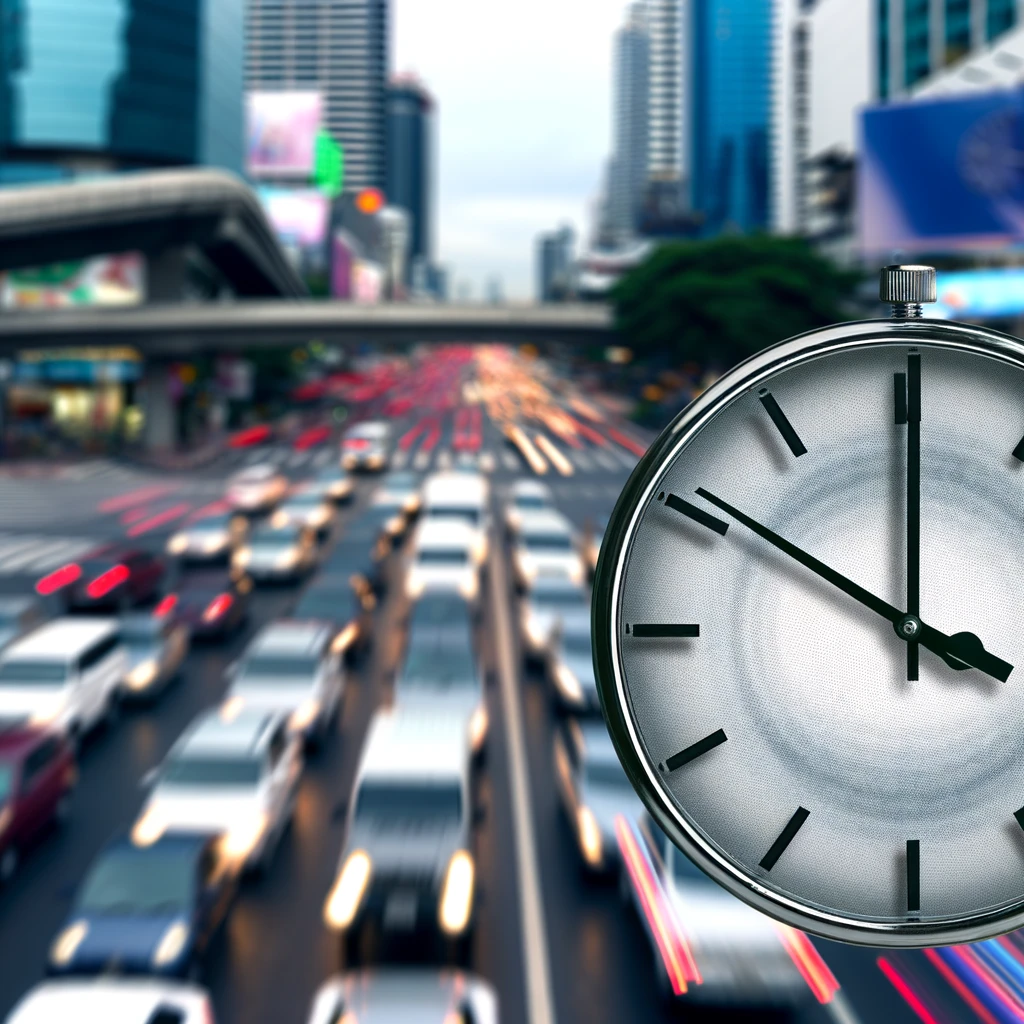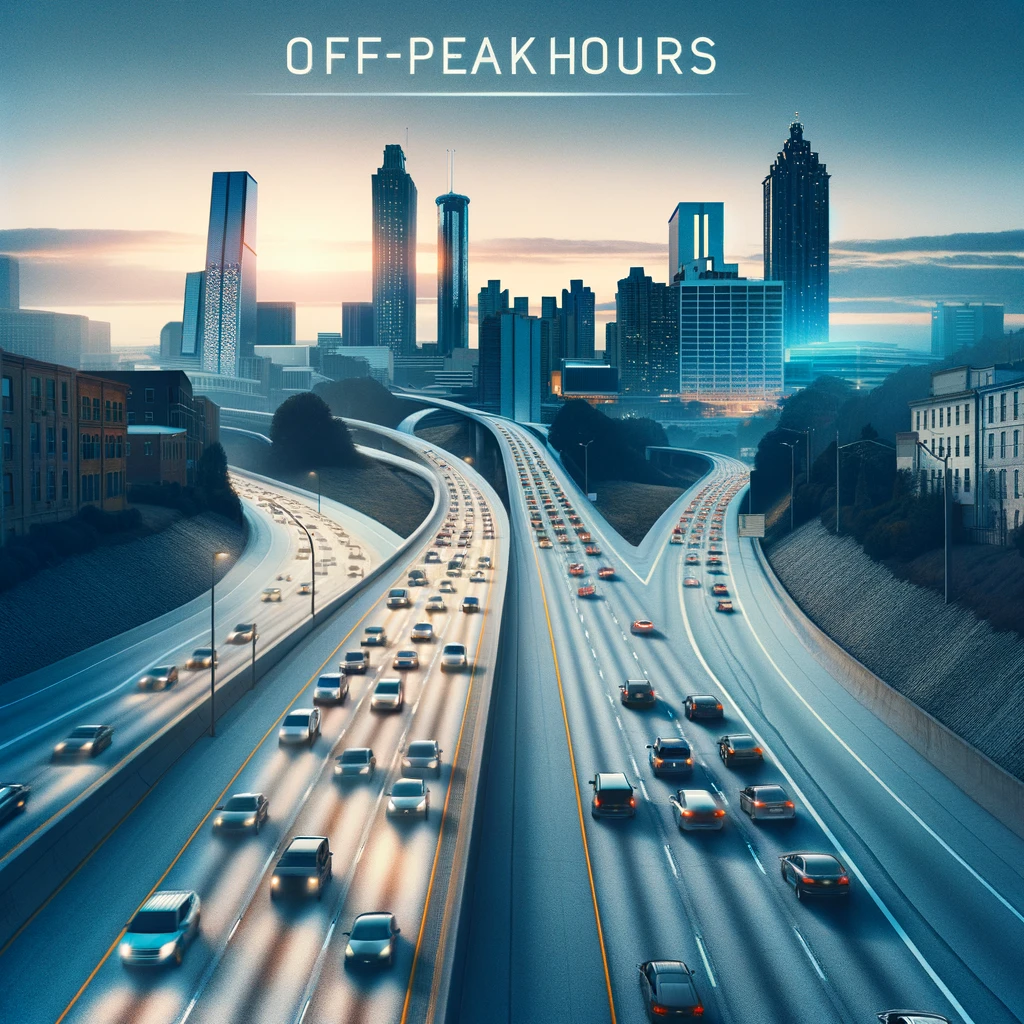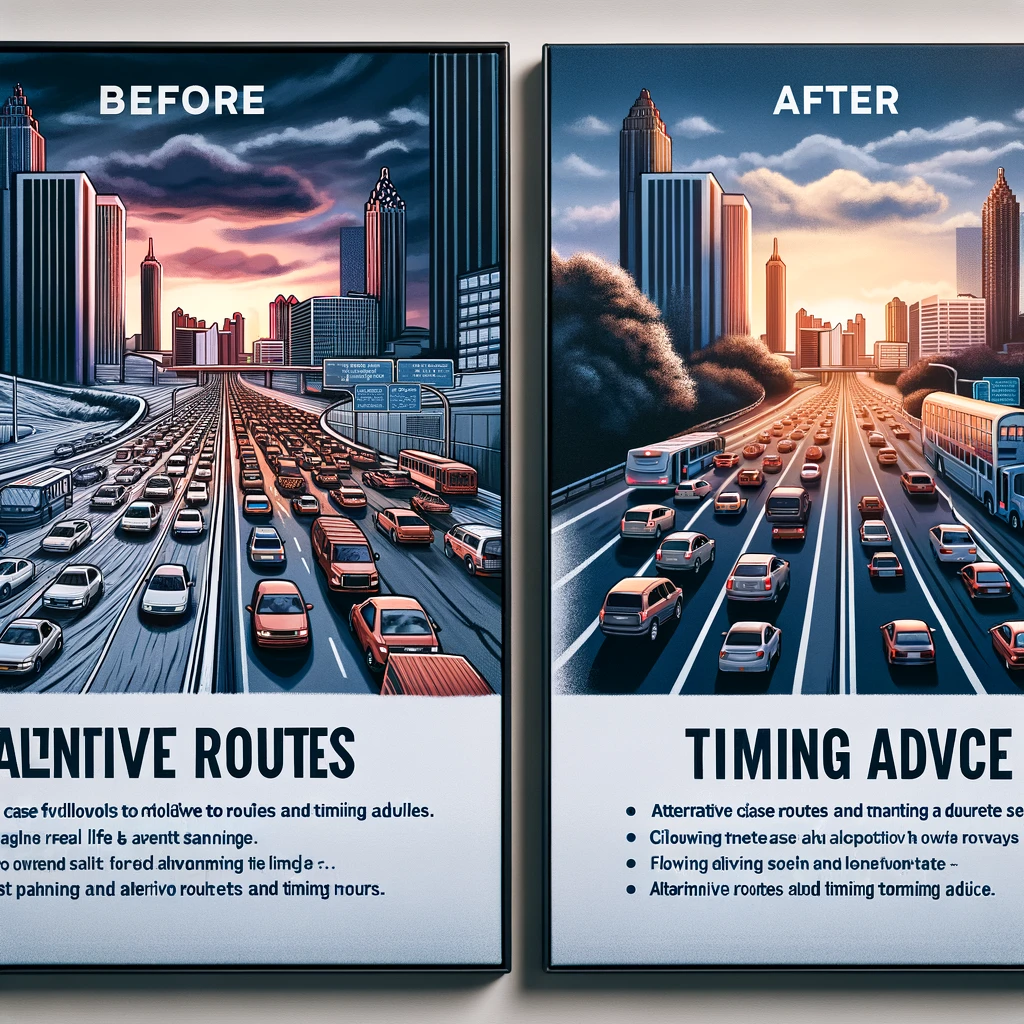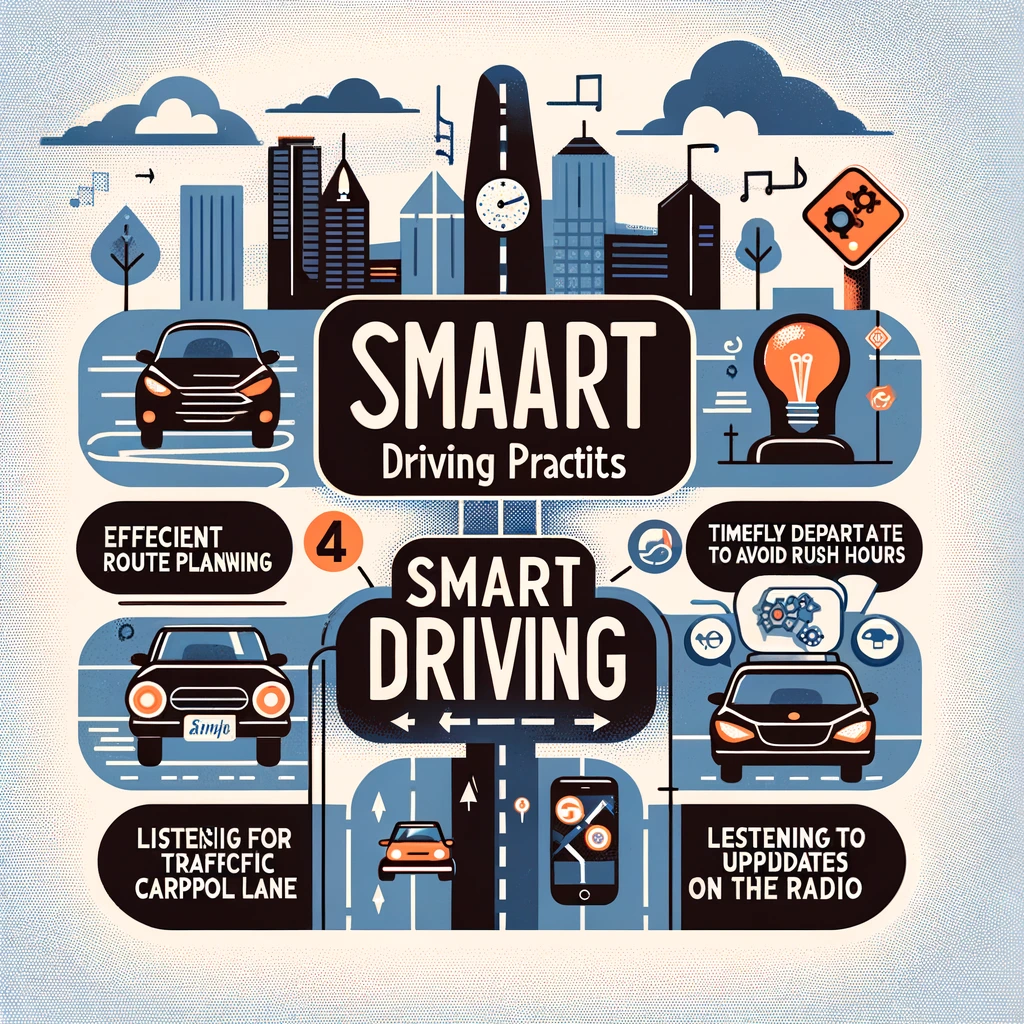Best time to drive through Atlanta In 2024: Navigating Traffic

Atlanta, Georgia, is a bustling metropolis known for its vibrant culture, rich history, and, unfortunately, its notorious traffic. As one of the most populous cities in the United States, navigating the city’s roadways can be a daunting task.
In this article, we will explore the ins and outs of Atlanta’s traffic patterns and provide you with valuable insights on how to find the best time to drive through Atlanta city. Whether you’re a daily commuter, a weekend traveler, or a first-time visitor, understanding when to hit the road can make all the difference in your Atlanta experience.
Why Timing Matters

Understanding the optimal times to traverse Atlanta’s streets is not just a matter of convenience; it’s a strategic move that can save you time, frustration, and even money. The city’s traffic can vary dramatically depending on the time of day, day of the week, and even the occurrence of special events. By arming yourself with knowledge about peak and off-peak hours, you can navigate Atlanta more efficiently, reduce your stress levels, and enjoy a smoother commute or travel experience.
Exploring Atlanta’s Traffic Landscape
Before we delve into the best times to drive through Atlanta, let’s take a moment to understand the city’s traffic profile and its historical traffic trends. This background information will set the stage for our in-depth exploration of optimal driving times.

Atlanta’s Traffic Profile
Atlanta’s sprawling layout and rapidly growing population have contributed to its traffic woes. The city is known for its extensive highway system, including the famous I-285 perimeter, but even these multi-lane highways can become clogged with vehicles during peak hours. Understanding the layout of the city and its primary traffic arteries is essential for navigating Atlanta effectively.
Historical Traffic Trends
To appreciate the current state of Atlanta’s traffic, it’s crucial to consider historical data. Over the years, the city has seen significant changes in traffic patterns due to population growth, economic development, and infrastructure improvements. Studying these trends can help us identify the best strategies for avoiding traffic bottlenecks in the present day.
For further insights and up-to-date traffic information, you can explore resources provided by the following government agencies:
- Georgia Department of Transportation: https://www.dot.ga.gov/
- City of Atlanta Department of Transportation: https://atldot.atlantaga.gov/
Peak Traffic Hours in Atlanta
Now that we have a solid foundation of Atlanta’s traffic landscape, let’s dive into the heart of the matter: peak traffic hours in the city. Atlanta experiences two primary rush hours each weekday, and understanding when they occur is vital for anyone planning to drive through the city.

Morning Rush Hour
Atlanta’s morning rush hour typically begins around 6:30 AM and can last until 9:00 AM. During this time, commuters from the suburbs pour into the city, causing congestion on major highways and arterial roads. Key routes like I-85, I-75, and I-285 are heavily affected, often leading to frustrating delays.
Evening Rush Hour
The evening rush hour in Atlanta kicks off around 4:00 PM and extends until 7:00 PM. As commuters head back to their homes in the suburbs, traffic congestion rears its head once again. Similar to the morning rush hour, major highways and thoroughfares become packed with vehicles, making for a slow and sometimes aggravating journey.
Off-Peak Hours for Smooth Travel
Avoiding the chaos of rush hour is a top priority for many Atlanta residents and visitors. Fortunately, there are windows of opportunity when traffic is lighter, and travel is more pleasant. Let’s explore the off-peak hours when you can enjoy a smoother ride through the city.

Weekday Off-Peak Times
- Late Morning Serenity: If you have flexibility in your schedule, consider travelling between 9:30 AM and 11:30 AM. During these hours, the morning rush has subsided, and the afternoon rush has yet to begin, providing a relatively peaceful driving experience.
- Early Afternoon Escape: Another off-peak window occurs from 1:00 PM to 3:30 PM. This is an excellent time to venture out, as the majority of commuters are either at work or have already reached their destinations.
- Night Owl Advantage: For those who don’t mind driving after dark, the hours between 8:00 PM and midnight offer some of the lightest traffic conditions on weekdays. This is especially beneficial for travelers heading into or out of the city for evening activities.
Weekend Traffic Patterns
Weekends in Atlanta exhibit a different traffic pattern compared to weekdays. Understanding these nuances can help you plan your leisure activities or getaways with ease.
- Early Bird Exploration: If you’re an early riser, consider hitting the road between 6:00 AM and 8:00 AM on weekends. During these hours, traffic is typically minimal, making it an ideal time for a day trip or weekend getaway.
- Midday Freedom: From 10:00 AM to 2:00 PM, Atlanta’s streets tend to be relatively calm on weekends. Take advantage of this period to explore the city or embark on a scenic drive in the surrounding areas.
- Saturday Night Relief: If you plan to be on the road during the weekend evenings, you’ll find that traffic congestion eases after 7:00 PM. This is perfect for those heading to dinner reservations, concerts, or other nighttime activities.
Factors Influencing Traffic Flow
While the daily and weekly traffic patterns provide valuable guidance, there are external factors that can significantly impact traffic conditions in Atlanta. Let’s explore how special events and weather conditions can throw a wrench into your travel plans.

Special Events
Atlanta is a city that loves to host special events, from sports games and concerts to festivals and conventions. These gatherings can have a profound impact on traffic, especially around the venues and their surrounding areas.
- Game Day Gridlock: If there’s a major sporting event in town, such as a Falcons football game at Mercedes-Benz Stadium or a Braves baseball game at Truist Park, expect increased traffic in the vicinity. Plan your route accordingly or consider public transportation options.
- Festival Frenzy: Atlanta hosts numerous festivals throughout the year, drawing crowds from near and far. While these events are enjoyable, they can lead to road closures and congestion in certain neighbourhoods. Check event schedules in advance to adjust your travel plans.
Weather Conditions
Atlanta experiences a range of weather conditions throughout the year, from sunny summers to occasional winter storms. These weather variations can impact traffic in several ways.
- Rainy Days Caution: Rainfall in Atlanta can lead to slippery roads and reduced visibility, causing traffic to slow down. Make sure your vehicle is equipped for wet conditions and leave extra time for your journey.
- Snow and Ice Challenges: While snow and ice are relatively rare in Atlanta, they can paralyze the city’s roadways when they do occur. Even a small amount of snow can lead to gridlock, as the city lacks the infrastructure to handle wintry conditions. If snow is in the forecast, it’s best to stay off the roads if possible.
Navigational Strategies
Armed with knowledge about Atlanta’s traffic patterns and the factors that can affect them, it’s time to discuss practical strategies for navigating the city efficiently.

Alternative Routes
- The Perimeter Advantage: One way to avoid the worst of Atlanta’s traffic is to utilize the I-285 perimeter. By skirting the city’s edges, you can bypass the often-congested downtown area. However, keep in mind that the perimeter can have its own traffic issues during peak times.
- Local Roads and Surface Streets: Sometimes, the quickest route from point A to point B may involve taking local roads rather than the highways. Apps like Google Maps and Waze can help you identify alternative routes that may save you time.
Use of Technology
- GPS and Navigation Apps: Modern technology has made it easier than ever to navigate Atlanta’s roads. GPS devices and navigation apps like Google Maps and Waze provide real-time traffic updates, alternative route suggestions, and estimated arrival times. Use these tools to your advantage, and be sure to keep your device charged.
- Traffic Alerts: Enable traffic alerts on your smartphone or GPS device to receive notifications about accidents, road closures, and other traffic-related incidents. Staying informed can help you make informed decisions while on the road.
Real-Life Examples and Case Studies
To provide you with a comprehensive understanding of traffic in Atlanta, let’s hear from local commuters and reference some relevant traffic studies.

Samantha’s Story: A Daily Commuter’s Perspective
Samantha, a resident of Marietta, commutes to downtown Atlanta every weekday for work. She shares her insights on navigating Atlanta’s traffic:
“Samantha: Commuting into Atlanta can be a challenge, but I’ve found that leaving my house by 6:00 AM allows me to beat the worst of the morning rush. On the way home, I usually wait until around 7:00 PM to avoid the evening traffic.”
John’s Weekend Getaway
John, an Atlanta native, enjoys exploring the city and its surroundings on weekends. He offers his tips for a stress-free weekend drive:
“John: Weekend mornings are the best time to explore Atlanta without worrying about traffic. I like to head out early for brunch or a hike in one of the nearby parks. The roads are much quieter, and parking is a breeze.”
Navigating Atlanta: Insights from the Latest GDOT Traffic Analysis
The Georgia Department of Transportation (GDOT) plays a pivotal role in examining traffic flow and congestion across Atlanta, aiming to enhance the commuting experience for both residents and visitors. Through their diligent traffic studies, GDOT identifies areas of heavy congestion and proposes solutions to alleviate these bottlenecks.

Key Observations and Alternative Routes:
- Peak Morning Traffic on I-85: Recognizing the challenges faced by commuters heading towards Atlanta in the morning, it’s advisable to look beyond the usual paths. For instance, those approaching from the north might find GA-400, followed by a strategic switch to I-285 and subsequent surface streets, a smoother journey into the city’s heart. Southern commuters could bypass the hustle by taking US-29 or exploring GA-154/166 for a more direct yet less congested route.
- Evening Congestion on I-285: As the city’s perimeter highway, I-285 can turn into a bottleneck during the evening rush. Exploring alternative corridors like GA-141 or GA-316 might offer a respite from the snarls, especially for suburban dwellers looking to avoid the fray. Dipping into lesser-known local roads to access quieter I-285 entrances could also ease your commute home.
- Traffic Spikes During Events: When concerts and events take over downtown, the I-75/I-85 Connector becomes even more challenging. An effective strategy might involve leveraging I-20 for a less direct but smoother approach to downtown or considering the convenience of MARTA’s rail service to bypass the congestion entirely. For those coming from afar, parking at a MARTA station and riding the train downtown could save time and hassle.
In light of these insights from GDOT, understanding the full spectrum of your routing options can drastically improve your daily commute or journey to special events in Atlanta. Armed with this knowledge, you’re better equipped to navigate the city’s traffic dynamics, leading to a more pleasant and efficient driving experience. By considering these alternative routes and strategies, we can collectively contribute to smoother traffic flow and reduced congestion in our vibrant city.
Practical Tips for Drivers
Now that we’ve covered the intricacies of Atlanta’s traffic, let’s wrap up with some practical tips to help you navigate the city with confidence.

Planning Ahead
- Use Traffic Apps: Install and use navigation apps like Google Maps or Waze to check real-time traffic conditions before you start your journey. These apps can suggest the fastest routes based on current traffic.
- Leave Early or Late: If possible, plan your trips during off-peak hours, either early in the morning or late in the evening. This can significantly reduce your travel time.
- Flexibility is Key: Be prepared to adjust your plans if you receive traffic alerts or encounter unexpected delays. Having a backup route in mind can be a lifesaver.
Safety Considerations
- Stay Alert: Traffic in Atlanta can be unpredictable, so it’s essential to stay focused on the road. Avoid distractions like texting or talking on the phone while driving.
- Maintain Your Vehicle: Ensure your vehicle is in good working condition, with properly inflated tires, working lights, and functioning brakes. Regular maintenance can help prevent breakdowns and accidents.
Conclusion
In conclusion, Atlanta’s traffic is a complex web of rush hours, special events, and weather-related challenges. By understanding the city’s traffic patterns, leveraging technology, and following practical tips, you can significantly improve your driving experience in Atlanta. Remember, timing is everything, so plan your journeys wisely, and you’ll find that navigating Atlanta’s streets can be a breeze.
Heading to Chicago next? We’ve got you covered – see our guide, Best Time to Drive Through Chicago In 2024
Frequently Asked Questions (FAQs) About Navigating Atlanta’s Traffic
What makes Atlanta’s traffic unique and challenging?
Atlanta’s traffic is unique due to its sprawling layout, extensive highway system, and rapidly growing population. The city’s traffic can be challenging because it experiences heavy congestion during both morning and evening rush hours, along with occasional gridlock caused by special events and weather-related issues.
What are the best times to avoid Atlanta’s rush hour traffic?
To avoid Atlanta’s rush hour traffic, consider traveling during weekday off-peak times, such as late morning (9:30 AM – 11:30 AM) and early afternoon (1:00 PM – 3:30 PM). Evenings after 7:00 PM on weekdays are also relatively light. On weekends, early mornings (6:00 AM – 8:00 AM) and midday (10:00 AM – 2:00 PM) are excellent options for smoother travel.
How do special events impact Atlanta’s traffic?
Special events like sports games, festivals, and conventions can have a significant impact on Atlanta’s traffic. They often lead to increased congestion around event venues and nearby areas. It’s advisable to check event schedules in advance and plan your routes accordingly to minimize delays.
What should I do if I encounter rainy or wintry conditions in Atlanta?
During rainy conditions, exercise caution by reducing your speed and increasing following distances. If wintry conditions like snow or ice are forecasted, it’s generally best to stay off the roads, as Atlanta is not well-equipped to handle such weather. Staying informed about weather conditions and road closures through local news and traffic apps is crucial.
How can I find alternate routes to avoid heavy traffic in Atlanta?
You can find alternate routes to avoid heavy traffic in Atlanta by using navigation apps like Google Maps and Waze. These apps provide real-time traffic updates and suggest alternative routes based on current conditions. Additionally, consider using the I-285 perimeter to bypass downtown congestion during peak hours.
